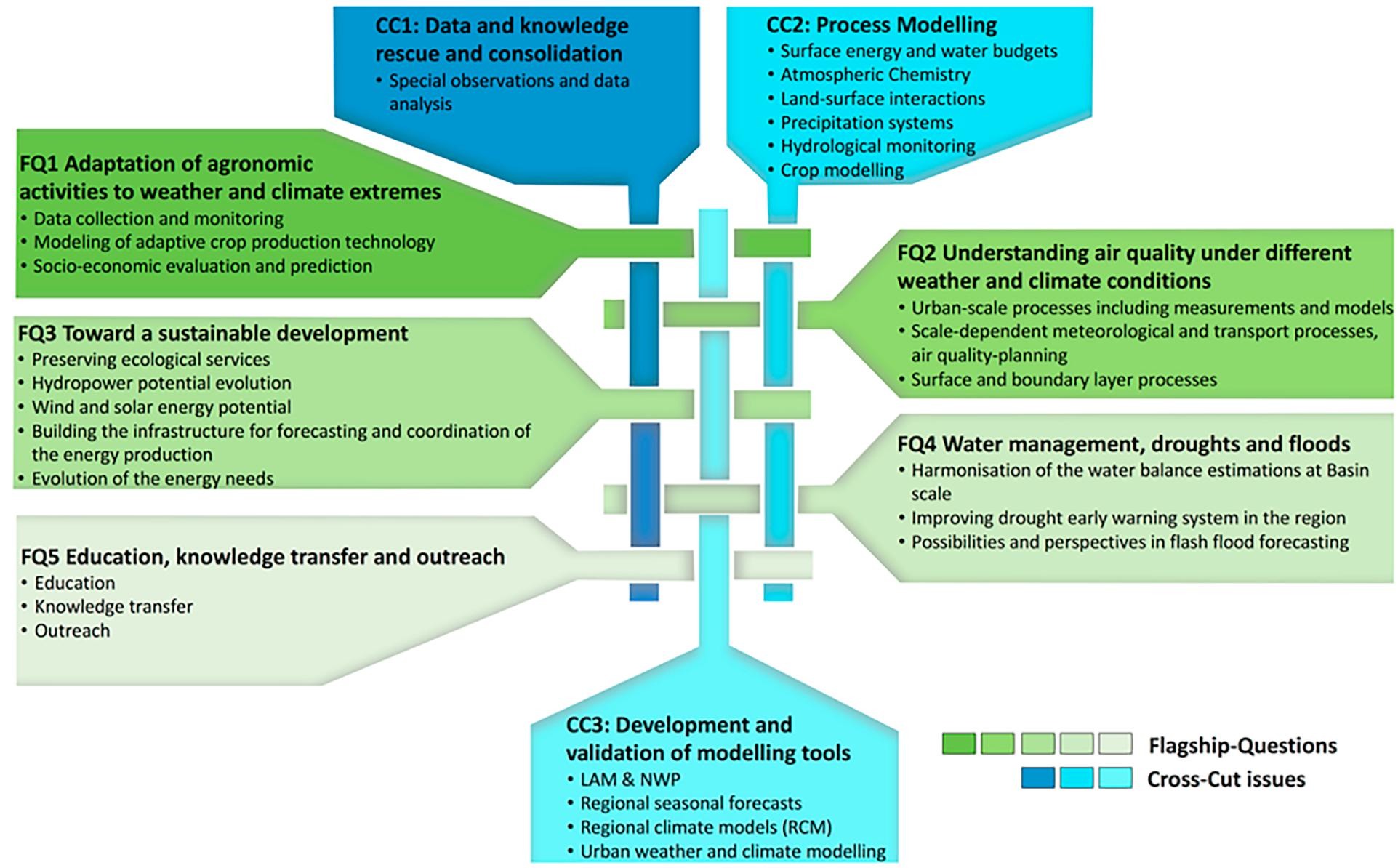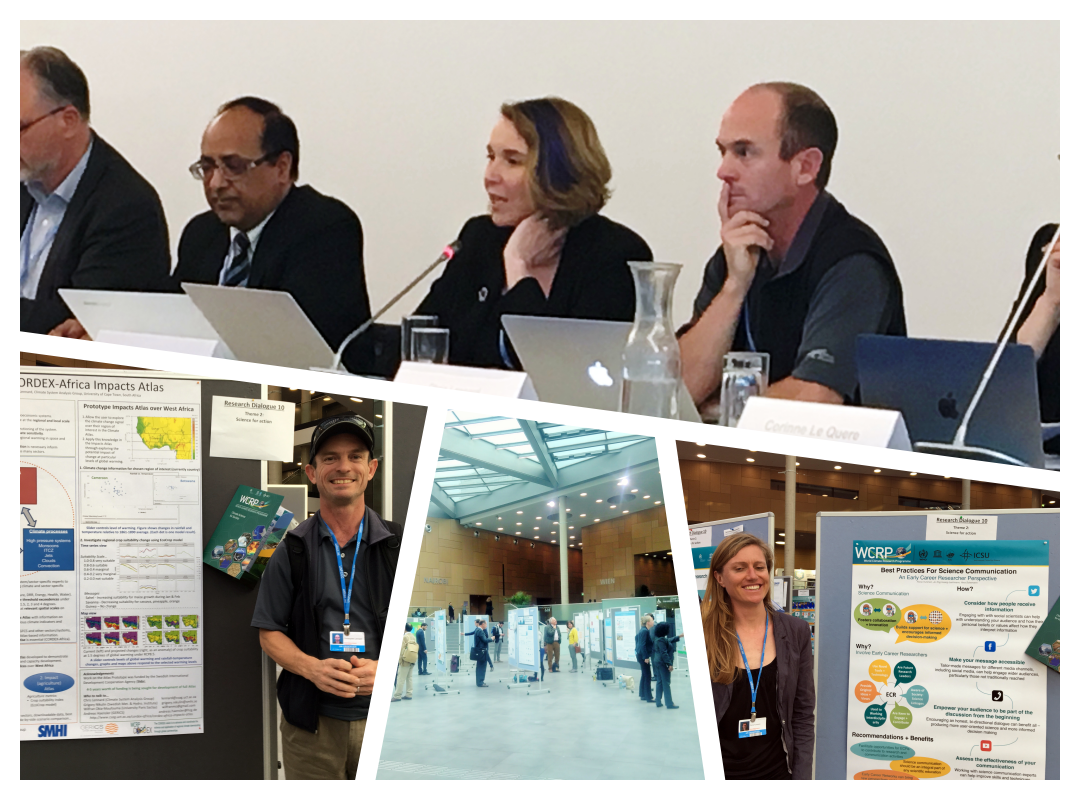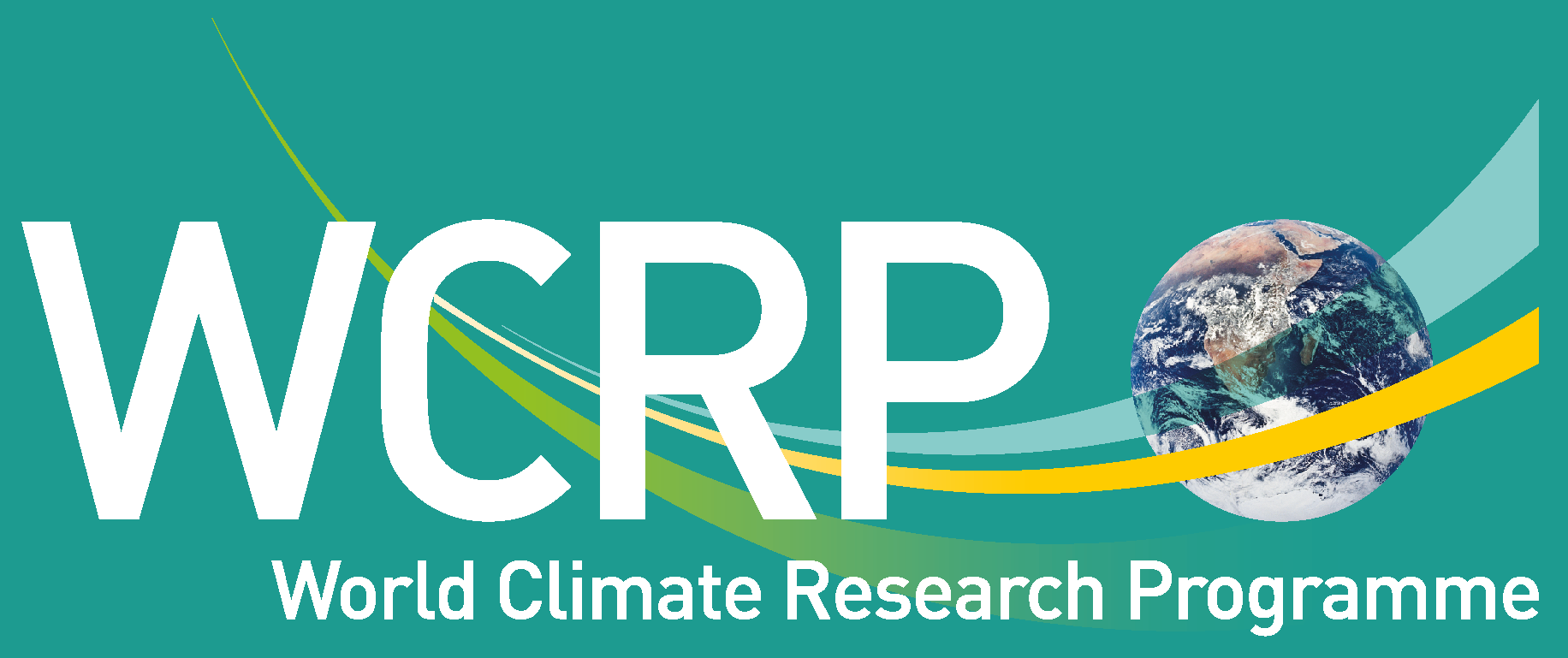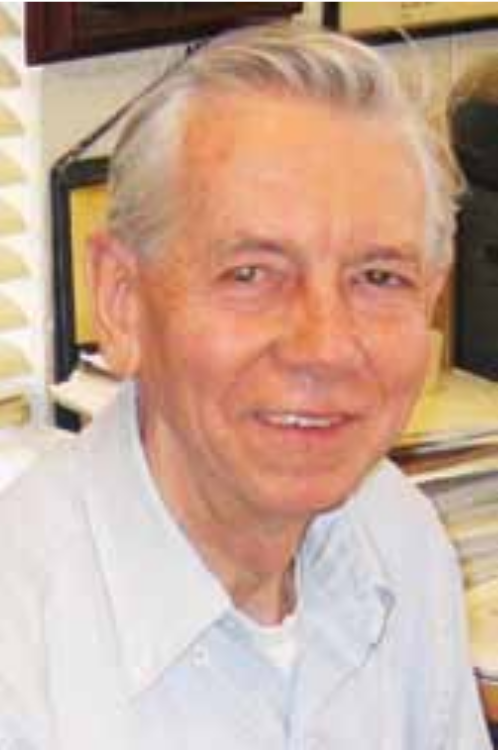- Details
 The IPCC Task Group on Data Support for Climate Change Assessments (TG-Data) is currently seeking nominations. Click the heading above for further details.
The IPCC Task Group on Data Support for Climate Change Assessments (TG-Data) is currently seeking nominations. Click the heading above for further details.- Details
 The "Second WCRP Summer School on Climate Model Development" was held in Cachoeira Paulista, Brazil, on 22-31 January. It was hosted by the Brazil National Institute for Space Research, Center for Weather Forecasting and Climate Studies (INPE/CPTEC). In its second edition, the WCRP modelling summer school focused on a current scientific challenge: the development of scale-aware parameterizations with emphasis on the so called "grey zone", that is, models with horizontal resolution ranging from 1km to 10km. Click the headline to read the full summer school report.
The "Second WCRP Summer School on Climate Model Development" was held in Cachoeira Paulista, Brazil, on 22-31 January. It was hosted by the Brazil National Institute for Space Research, Center for Weather Forecasting and Climate Studies (INPE/CPTEC). In its second edition, the WCRP modelling summer school focused on a current scientific challenge: the development of scale-aware parameterizations with emphasis on the so called "grey zone", that is, models with horizontal resolution ranging from 1km to 10km. Click the headline to read the full summer school report.- Details

A lack of detailed information on climate change for impact and adaptation planning led, in 2009, to a call by WCRP for greater coordination across downscaling activities. This eventually resulted in the design of the CORDEX framework, and CORDEX became a formal WCRP Programme in 2012. In the short time since, CORDEX has evolved into a major developer and producer of regional climate science and information. Click the headline to read the full CORDEX spotlight article.
- Details
 WCRP and the World Weather Research Programme (WWRP) are jointly organizing the "International Conferences on Subseasonal to Decadal Prediction", to be held in Boulder, USA, on 17-21 September 2018. They will serve as one important step toward ever-increasing collaboration across timescales to address societal needs for seamless and integrated climate predictions. Click the headline for details.
WCRP and the World Weather Research Programme (WWRP) are jointly organizing the "International Conferences on Subseasonal to Decadal Prediction", to be held in Boulder, USA, on 17-21 September 2018. They will serve as one important step toward ever-increasing collaboration across timescales to address societal needs for seamless and integrated climate predictions. Click the headline for details.
Incoming WMO Chief Scientist and Director of Research, Pavel Kabat, receives Austrian Cross of Honor
- Details

- Details
- Details
 The International Science Council's project "Transdisciplinary Research-Oriented Pedagogy for Improving Climate Studies and Understanding" (TROP ICSU) is consolidating teaching resources for climate change education, aiming to integrate them with the core curricula at secondary school and university levels. In an anticipated expansion of its activities, the TROP ICSU project is seeking feedback from teachers and scientists in educational roles. Click the headline above for more information.
The International Science Council's project "Transdisciplinary Research-Oriented Pedagogy for Improving Climate Studies and Understanding" (TROP ICSU) is consolidating teaching resources for climate change education, aiming to integrate them with the core curricula at secondary school and university levels. In an anticipated expansion of its activities, the TROP ICSU project is seeking feedback from teachers and scientists in educational roles. Click the headline above for more information.- Details
 The Cities and Climate Change Science Conference in Edmonton, taken place this March with WCRP involvement, had successfully set a major milestone to develop and implement a global research and action agenda on cities and climate change. For following steps and in the effort of stimulatIng research and the production of knowledge, the journal "Urban Climate" is inviting, until 15 July 2018, abstracts for a special issue on "Urban Data and Climate Information Services". Click the headline above for more information.
The Cities and Climate Change Science Conference in Edmonton, taken place this March with WCRP involvement, had successfully set a major milestone to develop and implement a global research and action agenda on cities and climate change. For following steps and in the effort of stimulatIng research and the production of knowledge, the journal "Urban Climate" is inviting, until 15 July 2018, abstracts for a special issue on "Urban Data and Climate Information Services". Click the headline above for more information.- Details
 Through a joint consultation process with WCRP expert bodies and activity chairs, WCRP leadership has prepared the next Draft WCRP Strategic Plan which is now open for public comment. WCRP welcomes your comments and invites you to share this call among your colleagues and networks. This public consultation phase will take place until 31 August 2018. It will enable WCRP, jointly with its wider community, to shape climate research priorities for the next decade. For details on the Draft Strategic Plan 2019-2029 and how to participate in the public consultation phase, please click the headline above.
Through a joint consultation process with WCRP expert bodies and activity chairs, WCRP leadership has prepared the next Draft WCRP Strategic Plan which is now open for public comment. WCRP welcomes your comments and invites you to share this call among your colleagues and networks. This public consultation phase will take place until 31 August 2018. It will enable WCRP, jointly with its wider community, to shape climate research priorities for the next decade. For details on the Draft Strategic Plan 2019-2029 and how to participate in the public consultation phase, please click the headline above.- Details
 PannEx is a Regional Hydroclimate Project (RHP) undertaken at the regional scale of the Pannonian Basin, under the umbrella of WCRP's Global Energy and Water Exchanges Project (GEWEX). In their newly published article “PannEx: The Pannonian Basin Experiment”, the authors around the PannEx team identified five flagship activities and three cross-cutting actions combining current scientific challenges with related societal needs.
PannEx is a Regional Hydroclimate Project (RHP) undertaken at the regional scale of the Pannonian Basin, under the umbrella of WCRP's Global Energy and Water Exchanges Project (GEWEX). In their newly published article “PannEx: The Pannonian Basin Experiment”, the authors around the PannEx team identified five flagship activities and three cross-cutting actions combining current scientific challenges with related societal needs.- Details
 The IPCC invites nominations for Expert Reviewers for the First Order Draft of its "Special Report on Climate Change and Land". Expert Reviewers should hold expertise in one or several of the report's five climate change-related focus areas, namely, desertification, land degradation, sustainable land management, food security, and greenhouse gas fluxes in terrestrial ecosystems. Click the headline for details.
The IPCC invites nominations for Expert Reviewers for the First Order Draft of its "Special Report on Climate Change and Land". Expert Reviewers should hold expertise in one or several of the report's five climate change-related focus areas, namely, desertification, land degradation, sustainable land management, food security, and greenhouse gas fluxes in terrestrial ecosystems. Click the headline for details.- Details
 Members of WCRP's Grand Challenge on Weather and Climate Extremes (GC-Extremes) and co-authors published a Nature Climate Change perspective article on "Future climate risk from compound events". The article is partially based on outcomes of the workshop "Addressing the challenge of compound events" which was held in April 2017 at the ETH Zurich in context of the GC-Extremes. Click the headline for more information.
Members of WCRP's Grand Challenge on Weather and Climate Extremes (GC-Extremes) and co-authors published a Nature Climate Change perspective article on "Future climate risk from compound events". The article is partially based on outcomes of the workshop "Addressing the challenge of compound events" which was held in April 2017 at the ETH Zurich in context of the GC-Extremes. Click the headline for more information.- Details
 WCRP is organizing a workshop on "The Earth’s Energy Imbalance and its implications" in Toulouse, France, from 13-16 November 2018. Abstracts are invited until 13 July 2018. The workshop's main aim is to initiate a new WCRP-wide activity on Earth’s energy imbalance with broad participation from both within and beyond WCRP's related initiatives. Click the headline for more information.
WCRP is organizing a workshop on "The Earth’s Energy Imbalance and its implications" in Toulouse, France, from 13-16 November 2018. Abstracts are invited until 13 July 2018. The workshop's main aim is to initiate a new WCRP-wide activity on Earth’s energy imbalance with broad participation from both within and beyond WCRP's related initiatives. Click the headline for more information.- Details
 Scientists located in elegible countries may consider submitting proposals to the EU JPI Climate's AXIS call. The call's goal is to broaden the climate-related knowledge base that helps guiding societies in their transition to sustainability. Proposals are expected to mostly be of small to medium size (0.3 - 2 million €) and of a duration of up to 3 years. Pre-registrations must be received by 18 June 2018 and full proposals by 8 October 2018. Click the headline for details.
Scientists located in elegible countries may consider submitting proposals to the EU JPI Climate's AXIS call. The call's goal is to broaden the climate-related knowledge base that helps guiding societies in their transition to sustainability. Proposals are expected to mostly be of small to medium size (0.3 - 2 million €) and of a duration of up to 3 years. Pre-registrations must be received by 18 June 2018 and full proposals by 8 October 2018. Click the headline for details.- Details
 The World Climate Research Programme is soliciting offers to host an International Project Office (IPO) to coordinate its cryospheric activities from 1st January 2019 onward. For more information, click the headline above.
The World Climate Research Programme is soliciting offers to host an International Project Office (IPO) to coordinate its cryospheric activities from 1st January 2019 onward. For more information, click the headline above.- Details

WCRP provided multiple inputs to the 48th session of the Subsidiary Body for Scientific and Technological Advice (SBSTA) of the United Nations Framework Convention on Climate Change (UNFCCC). Notably, a keynote presentation by WCRP JSC vice-chair Amanda Lynch informed on strategic plans and partnerships of WCRP, as well as its ongoing support to fundamental understanding of climate and climate change in service to society.
To read more, click the headline above.
- Details
 WCRP is calling for (self-)nominations for membership in six of its expert panels, namely both Advisory Councils (WDAC and WMAC), three Working Groups (WGCM, WGSIP, WGNE) and the CORDEX Science Advisory Team. New members are sought in each panel for a four-year term from January 2019 to December 2022. Nominations should be submitted via an online nomination form by 30 May 2018. To read more, click the headline above.
WCRP is calling for (self-)nominations for membership in six of its expert panels, namely both Advisory Councils (WDAC and WMAC), three Working Groups (WGCM, WGSIP, WGNE) and the CORDEX Science Advisory Team. New members are sought in each panel for a four-year term from January 2019 to December 2022. Nominations should be submitted via an online nomination form by 30 May 2018. To read more, click the headline above.- Details
 The IPCC invites nominations for Expert Reviewers for the First Order Draft of its "Special Report on the Ocean and Cryosphere in a Changing Climate". The desired areas of expertise are impacts of climate change on ocean, coastal, polar and mountain ecosystems, the human communities that depend on them, as well as vulnerabilities, adaptation and climate-resilient development. Click the headline for details.
The IPCC invites nominations for Expert Reviewers for the First Order Draft of its "Special Report on the Ocean and Cryosphere in a Changing Climate". The desired areas of expertise are impacts of climate change on ocean, coastal, polar and mountain ecosystems, the human communities that depend on them, as well as vulnerabilities, adaptation and climate-resilient development. Click the headline for details.- Details
 Roger Barry, renowned and respected scientist and valued member of the WCRP community, passed away on March 19, 2018 at the age of 82.
Roger Barry, renowned and respected scientist and valued member of the WCRP community, passed away on March 19, 2018 at the age of 82. Roger was an esteemed and distinguished climate scientist and involved in several WCRP initiatives. The numerous contributions he brought and awards he received are a testament to the productivity, dedication, and expertise of a highly valued member of the global climate research community.
- Details

A new open-access paper in “Nature Partner Journals – Climate and Atmospheric Science” describes how weather and climate scientists work together to improve forecasts for weeks and months ahead. The authors are Annarita Mariotti, Director of the NOAA MAPP Program, as well as Paolo Ruti and Michel Rixen, who coordinate research for the World Weather Research Programme and World Climate Research Programme, respectively.
- Details

The Earth Energy Imbalance (EEI) is one of the most fundamental metrics defining the status of global climate change and expectations for continued global warming. WCRP Core Projects work together for a new WCRP-wide initiative to identify research goals and opportunities for Earth’s Energy Imbalance and to strengthen future international scientific collaboration with experts for EEI assessments.
Save the dates for this opportunity for international scientific collaborations: The WCRP workshop will be held on 13-16 November 2018 in Toulouse, France. Further details can be found here and will be updated through the websites of WCRP and its Core Projects.
- Details

Future Earth is a global platform for international scientific collaboration on global environmental change. Over 20 global research programmes operate under the umbrella of Future Earth. The ties and partnerships between Future Earth and WCRP are strong and productive, for example within the CitiesIPCC activities, the recently developed Knowledge-Action Network on Emergent Risks and Extreme Events, and WCRP's Working Group on Regional Climate. Future Earth is sponsored by, inter alia, the International Council for Science (ICSU), which is also a co-sponsor of WCRP.
The Future Earth Secretariat operates in a decentralized structure around five Secretariat "Global Hubs". For its Paris Secretariat Global Hub, Future Earth is now soliciting applications for the Director position. For details, please see the vacancy announcement on the Future Earth homepage. The deadline is 10 April 2018.
- Details

The Subseasonal-to-Seasonal (S2S) Prediction Project is a joint undertaking by WCRP and WWRP which completed its first phase between 2013 and 2017. Last week, the Project's Phase I Final Report has been officially published, reporting on the period from November 2013 to December 2017. The report can be downloaded from WCRP's publications page. The S2S Prediction Project aims to improve forecast skill and understanding on the S2S timescale with special emphasis on high-impact weather events. Its full scope is laid out on the S2S Prediction Project homepage as well as on WCRP's S2S webpage. The proposal for the S2S Prediction Project's Phase II can be downloaded from the S2S homepage.
- Details

The abstract submission deadline for the "International Conferences on Subseasonal to Decadal Prediction" has been extended to Tuesday, 27 March 2018. The week-long event comprises both the "Second International Conference on Subseasonal to Seasonal Prediction (S2S)", the "Second International Conference on Seasonal to Decadal Prediction (S2D)" as well as a joint segment addressing mutual and emerging topics. The meeting will be held Sept. 17-21 in Boulder, CO, USA. It is being organized by activities within and close to the WCRP community, including the DCPP, GC-NTCP, WGSIP, S2S, and CLIVAR's DCVP panel. For full details, see the conference home page.
- Details

The first International Symposium on Regional Reanalysis will take place from 17 to 19 July 2018 in Bonn, Germany. The event aims to discuss and promote all aspects of regional reanalyses, and is hosted by the Hans-Ertel-Centre for Weather Research. Particular emphases will be on applications and user interactions as well as land surface heterogeneity. The symposium's organizing committee is co-led by Jan Keller, co-chair of the WCRP WDAC's Task Team for Intercomparison of Reanalyses (TIRA). For all details on scope and abstract submission (deadline 15 April), see the Symposium homepage.

